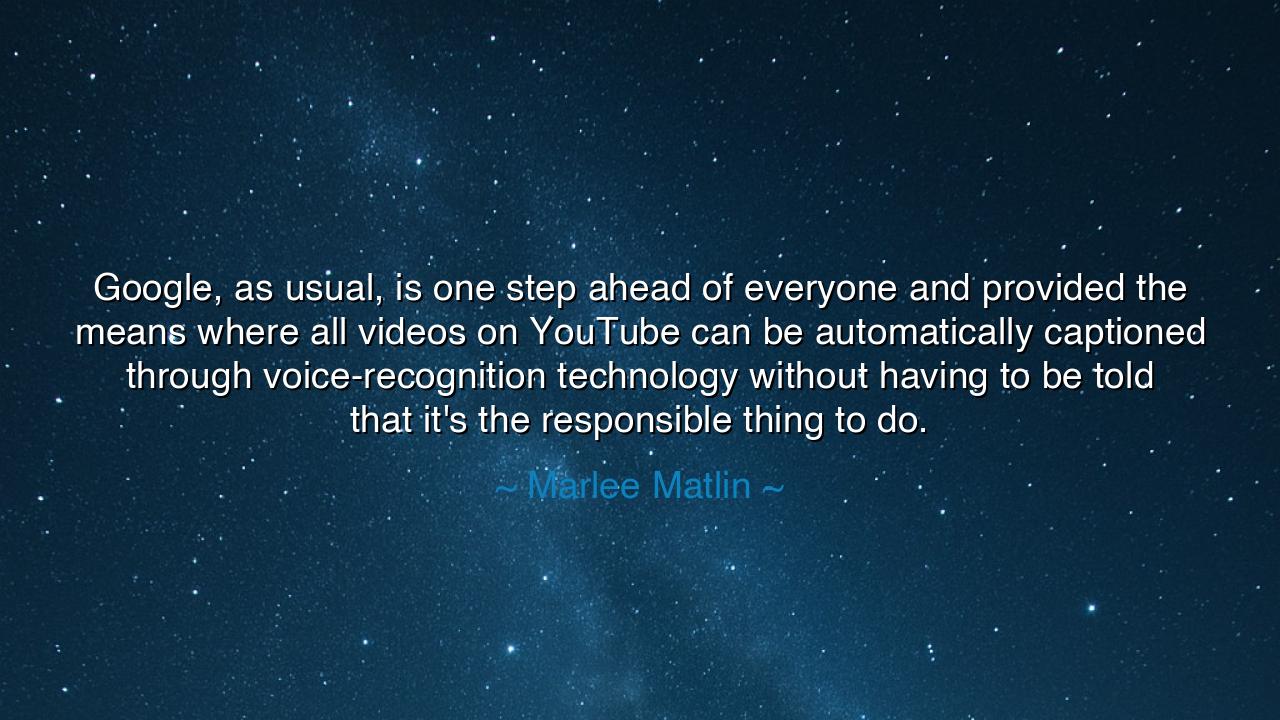
Google, as usual, is one step ahead of everyone and provided the
Google, as usual, is one step ahead of everyone and provided the means where all videos on YouTube can be automatically captioned through voice-recognition technology without having to be told that it's the responsible thing to do.






Marlee Matlin, whose life has been a testimony to the power of perseverance and the dignity of every human voice, once said: “Google, as usual, is one step ahead of everyone and provided the means where all videos on YouTube can be automatically captioned through voice-recognition technology without having to be told that it’s the responsible thing to do.” In these words lies both celebration and teaching: the acknowledgment that technology, when wielded with foresight and compassion, becomes more than a tool—it becomes a bridge across silence, a light for those left in the shadows.
The meaning of her words begins with the recognition of responsibility. For too long, many inventions have been crafted without thought for all of humanity. The deaf, the blind, the marginalized, the forgotten—too often they are left behind as progress rushes forward. But here, Matlin praises a rare act: the foresight of Google to provide captions on YouTube videos through the miracle of voice-recognition technology. This was not done because someone demanded it, nor because law forced it, but because it was right. True progress is not only innovation, but innovation that carries compassion within it.
The ancients themselves understood this principle. When Alexander the Great built his empire, he did not merely conquer; he ordered roads to be paved, cities to be founded, libraries to be filled. He saw that empire was more than power—it was the weaving together of people through shared access to knowledge. In the same way, the automatic captioning of video is not only clever technology; it is the paving of a road, the building of a bridge, a way for those once excluded to walk alongside others in equal stride.
Matlin’s praise is profound because she herself embodies the struggle of accessibility. As the first deaf actress to win an Academy Award, she broke barriers not through pity, but through talent and determination. Yet even she has spoken often of the countless challenges imposed not by deafness itself, but by society’s failure to listen. Thus, when she sees technology take a step to include rather than exclude, she honors it as a noble act. For accessibility is not charity—it is justice.
Yet her words also carry a warning, though gently spoken: that such responsibility should not need to be commanded. She marvels that Google did not need to be told, that they acted of their own accord. How many others, then, fail to act simply because they are not forced? The true test of leadership, whether of a company, a nation, or a single human soul, is to do what is right not when compelled, but when free to choose otherwise. Responsibility embraced voluntarily becomes greatness; responsibility avoided becomes disgrace.
The lesson for us, therefore, is clear: let your own technology—whether vast as a global platform or small as the tools in your daily life—be guided by compassion. Do not wait to be told to include, to share, to lift others up. Ask yourself instead: who is being left behind, and how can I bridge the gap? Whether in your work, your family, or your community, the true measure of progress is not how much easier life becomes for the strong, but how much more possible it becomes for the weak.
Therefore, O seekers of wisdom, take Matlin’s words into your heart. Celebrate the brilliance of voice-recognition technology, yes—but see beyond the tool to the spirit behind it. Learn to be “one step ahead,” not merely in skill, but in empathy. For the fascination of invention will fade, but the memory of how it opened doors for others will endure forever. And when you, too, act before being told, you walk the higher path—the path where humanity and technology merge not in cold machinery, but in the warmth of justice and inclusion.






AAdministratorAdministrator
Welcome, honored guests. Please leave a comment, we will respond soon